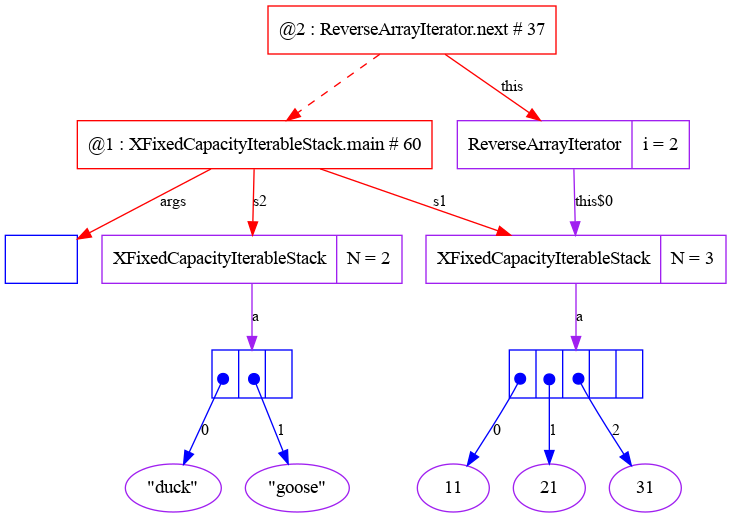01
02
03
04
05
06
07
08
09
10
11
12
13
14
15
16
17
18
19
20
21
22
23
24
25
26
27
28
29
30
31
32
33
34
35
36
37
38
39
40
41
42
43
44
45
46
47
48
49
50
51
52
53
54
55
56
57
58
59
60
61
62
63
64
65
|
package algs13;
import stdlib.*;
import java.util.Iterator;
public class XFixedCapacityIterableStack<T> implements Iterable<T> {
T[] a; // holds the items
int N; // number of items in stack
@SuppressWarnings("unchecked")
public XFixedCapacityIterableStack (int capacity) {
this.a = (T[]) new Object[capacity]; // no generic array creation
this.N = 0;
}
public int size () { return N; }
public boolean isEmpty () { return (N == 0); }
public void push (T item) {
if (item == null) throw new IllegalArgumentException ();
a[N] = item;
N++;
}
public T pop () {
N--;
T result = a[N];
a[N] = null;
return result;
}
public Iterator<T> iterator () {
return new ReverseArrayIterator ();
}
public class ReverseArrayIterator implements Iterator<T> {
private int i;
public ReverseArrayIterator() {
int numOccupied = N;
this.i = numOccupied - 1;
}
public boolean hasNext () { return i >= 0; }
public T next () {
T result = a[i];
i--;
return result;
}
}
public static void main (String[] args) {
//Trace.showBuiltInObjects (true);
//Trace.drawStepsOfMethod ("main");
//Trace.drawStepsOfMethod ("next");
//Trace.drawSteps();
//Trace.run ();
XFixedCapacityIterableStack<Integer> s1 = new XFixedCapacityIterableStack<> (5);
XFixedCapacityIterableStack<String> s2 = new XFixedCapacityIterableStack<> (3);
s1.push (11);
s1.push (21);
s1.push (31);
s2.push ("duck");
s2.push ("goose");
// Here's a nicer version
StdOut.print ("What's on the stack: ");
for (Integer k : s1) {
StdOut.print (k + " ");
}
StdOut.println ();
}
}
|






